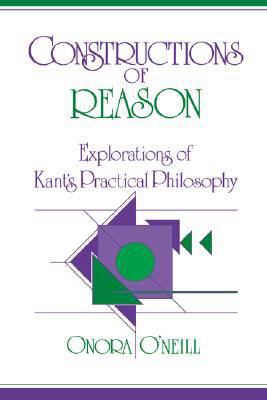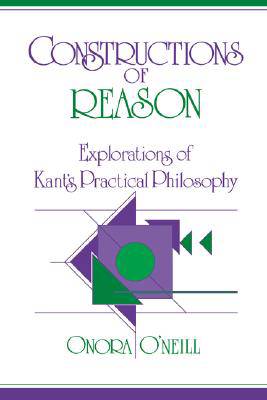
- Afhalen na 1 uur in een winkel met voorraad
- Gratis thuislevering in België vanaf € 30
- Ruim aanbod met 7 miljoen producten
- Afhalen na 1 uur in een winkel met voorraad
- Gratis thuislevering in België vanaf € 30
- Ruim aanbod met 7 miljoen producten
Zoeken
Constructions of Reason
Explorations of Kant's Practical Philosophy
Onora O'Neill
Hardcover | Engels
€ 170,45
+ 340 punten
Uitvoering
Omschrijving
Two centuries after they were published, Kant's ethical writings are as much admired and imitated as they have ever been, yet serious and long-standing accusations of internal incoherence remain unresolved. Onora O'Neill traces the alleged incoherences to attempts to assimilate Kant's ethical writings to modern conceptions of rationality, action and rights. When the temptation to assimilate is resisted, a strikingly different and more cohesive account of reason and morality emerges. Kant offers a "constructivist" vindication of reason and a moral vision in which obligations are prior to rights and in which justice and virtue are linked. O'Neill begins by reconsidering Kant's conceptions of philosophical method, reason, freedom, autonomy and action. She then moves on to the more familiar terrain of interpretation of the Categorical Imperative, while in the last section she emphasizes differences between Kant's ethics and recent "Kantian" ethics, including the work of John Rawls and other contemporary liberal political philosophers.
Specificaties
Betrokkenen
- Auteur(s):
- Uitgeverij:
Inhoud
- Aantal bladzijden:
- 264
- Taal:
- Engels
Eigenschappen
- Productcode (EAN):
- 9780521381215
- Verschijningsdatum:
- 26/01/1990
- Uitvoering:
- Hardcover
- Formaat:
- Genaaid
- Afmetingen:
- 152 mm x 229 mm
- Gewicht:
- 557 g

Alleen bij Standaard Boekhandel
+ 340 punten op je klantenkaart van Standaard Boekhandel
Beoordelingen
We publiceren alleen reviews die voldoen aan de voorwaarden voor reviews. Bekijk onze voorwaarden voor reviews.











